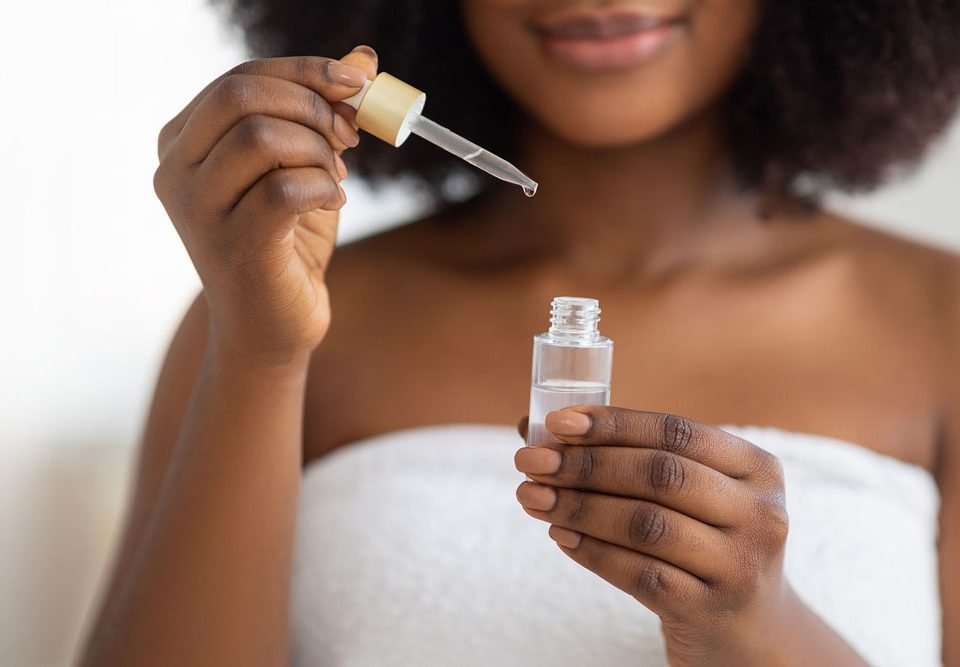Hyaluronic acid is a naturally occurring substance in the body that helps keep the skin hydrated and plump. As people age, the amount of hyaluronic acid in their skin decreases, which can lead to dryness, wrinkles, and sagging. However, using hyaluronic acid topically like this one for mature skin, or taking it as a supplement can help counteract these effects and provide numerous benefits for mature skin.
One of the main benefits of hyaluronic acid for mature skin is its ability to retain moisture. This can help improve skin elasticity and reduce the appearance of fine lines and wrinkles. In addition, hyaluronic acid can help promote collagen production, which is essential for maintaining skin firmness and elasticity. It can also help protect the skin from environmental damage and improve overall skin health.
Overall, incorporating hyaluronic acid into a skincare routine can provide numerous benefits for mature skin. Whether applied topically or taken as a supplement, hyaluronic acid can help hydrate the skin, reduce the appearance of fine lines and wrinkles, and promote collagen production. With its ability to improve overall skin health, it is no wonder that hyaluronic acid has become a popular ingredient in many skincare products.
Table of Contents
What is Hyaluronic Acid?
Hyaluronic acid (HA) is a naturally occurring substance found in the human body. It is a glycosaminoglycan, which is a type of molecule that is present in connective tissues throughout the body. HA is particularly abundant in the skin, eyes, and joints.
HA has numerous benefits for the skin, making it a popular ingredient in many skincare products. It is a powerful humectant, which means it is able to attract and retain moisture. This helps to keep the skin hydrated and plump, reducing the appearance of fine lines and wrinkles.
In addition to its hydrating properties, HA has also been shown to have antioxidant and anti-inflammatory effects. This can help to protect the skin from damage caused by free radicals and other environmental stressors.
HA is also involved in the wound healing process. It helps to promote cell proliferation and migration, which can speed up the healing of damaged tissue. Additionally, it has been shown to reduce scarring and improve the overall appearance of the skin.
Overall, HA is a versatile and beneficial substance that has numerous applications in skincare and other fields. Its ability to hydrate, protect, and heal the skin make it a valuable ingredient in many products designed to improve the appearance and health of mature skin.
How Does Hyaluronic Acid Benefit Mature Skin?
Hyaluronic acid is a naturally occurring substance in the body that helps to keep the skin hydrated and plump. As we age, our body’s production of hyaluronic acid decreases, leading to dry, sagging skin and the formation of fine lines and wrinkles. However, using hyaluronic acid skincare products can help to counteract these effects and provide a range of benefits for mature skin.
Reduces the Appearance of Fine Lines and Wrinkles
One of the primary benefits of hyaluronic acid for mature skin is its ability to reduce the appearance of fine lines and wrinkles. Hyaluronic acid is a humectant, which means that it attracts and retains moisture in the skin. This helps to plump up the skin and smooth out fine lines and wrinkles, giving the skin a more youthful appearance.
Increases Skin Hydration and Moisture Retention
Hyaluronic acid is also highly effective at increasing skin hydration and moisture retention. As we age, our skin becomes less able to retain moisture, which can lead to dryness, flakiness, and roughness. Hyaluronic acid helps to boost the skin’s moisture levels, keeping it soft, supple, and hydrated.
Improves Skin Elasticity and Firmness
Another benefit of hyaluronic acid for mature skin is its ability to improve skin elasticity and firmness. As we age, our skin loses its elasticity, leading to sagging and drooping. Hyaluronic acid helps to improve the skin’s elasticity, making it more firm and resilient, and reducing the appearance of sagging skin.
Helps with Wound Healing and Inflammation
In addition to its anti-aging benefits, hyaluronic acid can also help with wound healing and inflammation. Hyaluronic acid is naturally present in the body’s connective tissues, where it helps to promote tissue repair and reduce inflammation. When applied topically to the skin, hyaluronic acid can help to speed up the healing process of wounds and reduce inflammation, making it an effective ingredient for treating a range of skin conditions.
In conclusion, hyaluronic acid is a highly effective ingredient for improving the appearance and health of mature skin. Its ability to reduce the appearance of fine lines and wrinkles, increase skin hydration and moisture retention, improve skin elasticity and firmness, and help with wound healing and inflammation make it a valuable addition to any skincare routine for mature skin.
Different Forms of Hyaluronic Acid
Hyaluronic acid is a popular ingredient in the skincare industry due to its hydrating and anti-aging properties. It is available in different forms, including topical serums, injectable fillers, and oral supplements.
Topical Hyaluronic Acid Serums
Topical hyaluronic acid serums are a popular choice for mature skin. They come in various forms, including lotions, creams, gels, and ointments, and are applied directly to the skin. Hyaluronic acid serums work by attracting and retaining moisture in the skin, which helps to plump and hydrate it, reducing the appearance of fine lines and wrinkles. Order Hyaluronic Acid for mature skin here.
When choosing a hyaluronic acid serum, it is essential to look for a product that contains a high concentration of hyaluronic acid and has a low molecular weight. This ensures that the serum can penetrate the skin’s surface and deliver the maximum benefits.
Hyaluronic Acid Fillers
Hyaluronic acid fillers are a popular choice for those looking for a more immediate and dramatic anti-aging effect. Injectable hyaluronic acid fillers are used to add volume to the skin, reducing the appearance of deep wrinkles, and restoring lost facial volume.
Hyaluronic acid fillers are injected into the skin by a trained professional, and the effects can last for several months to a year. It is essential to choose a reputable and experienced practitioner when considering hyaluronic acid fillers.
Oral Hyaluronic Acid Supplements
Oral hyaluronic acid supplements are a newer form of hyaluronic acid that is gaining popularity in the skincare industry. These supplements come in the form of capsules or tablets and are taken orally.
While there is limited research on the effectiveness of oral hyaluronic acid supplements, some studies suggest that they may improve skin hydration and reduce the appearance of fine lines and wrinkles. However, it is essential to note that the effectiveness of oral hyaluronic acid supplements may vary depending on the individual.
In conclusion, hyaluronic acid is a versatile ingredient that is available in different forms, including serums, fillers, and supplements. When choosing a hyaluronic acid product, it is essential to consider the concentration, molecular weight, and the reputation of the manufacturer or practitioner.
Safety and Side Effects of Hyaluronic Acid
Hyaluronic acid is generally considered safe for most people when used appropriately. However, as with any medication or supplement, there are potential side effects and risks that should be considered.
Allergic Reactions and Sensitivity
Some people may be allergic or sensitive to hyaluronic acid. Symptoms of an allergic reaction may include itching, rash, hives, swelling, difficulty breathing, and dizziness. If you experience any of these symptoms after using hyaluronic acid, seek medical attention immediately.
Interactions with Medications and Health Conditions
Hyaluronic acid may interact with certain medications or health conditions. People who are taking medications or have health conditions should speak with their healthcare provider before using hyaluronic acid. Additionally, people who have a history of allergies or asthma may be at a higher risk for an allergic reaction to hyaluronic acid.
Safe Use During Pregnancy and Breastfeeding
There is limited research on the safety of hyaluronic acid during pregnancy and breastfeeding. As a precaution, pregnant or breastfeeding women should speak with their healthcare provider before using hyaluronic acid.
Injections
Hyaluronic acid injections are commonly used for cosmetic purposes, such as reducing the appearance of wrinkles. While these injections are generally safe, they may cause some side effects, such as redness, swelling, bruising, and itching at the injection site. In rare cases, hyaluronic acid injections may cause an allergic reaction or infection.
Dermatologist
It is recommended to consult with a dermatologist before using hyaluronic acid products, especially if you have sensitive skin or a history of allergic reactions.
Arthritis and Interstitial Cystitis
Hyaluronic acid injections are also used to treat joint pain caused by arthritis and interstitial cystitis. While these injections are generally safe, they may cause some side effects, such as pain, swelling, and redness at the injection site.
Overall, hyaluronic acid is generally considered safe when used appropriately. However, as with any medication or supplement, it is important to speak with a healthcare provider before using hyaluronic acid, especially if you have any underlying health conditions or allergies.
Other Ingredients that Complement Hyaluronic Acid
When it comes to mature skin, hyaluronic acid is a great ingredient to include in your skincare routine. However, combining it with other ingredients can enhance its benefits. Here are some ingredients that complement hyaluronic acid:
Ceramides and Niacinamide
Ceramides and niacinamide are two ingredients that work well with hyaluronic acid. Ceramides are lipids that help to strengthen the skin’s barrier, while niacinamide is a form of vitamin B3 that can help to reduce inflammation and improve the appearance of fine lines and wrinkles. Together, these ingredients can help to hydrate and protect the skin.
Glycerin and Aloe Vera
Glycerin and aloe vera are both humectants that can help to draw moisture into the skin. Glycerin is a clear, odorless liquid that can attract up to 1,000 times its weight in water, while aloe vera is a gel-like substance that can soothe and hydrate the skin. When combined with hyaluronic acid, these ingredients can help to keep the skin hydrated and plump.
Shea Butter and Sugar
Shea butter and sugar are two natural ingredients that can help to exfoliate and moisturize the skin. Shea butter is a rich, creamy butter that is high in fatty acids and vitamins, while sugar is a gentle exfoliant that can help to remove dead skin cells. When combined with hyaluronic acid, these ingredients can help to improve the texture and appearance of the skin.
Vitamin C and Retinol
Vitamin C and retinol are two powerful anti-aging ingredients that can help to reduce the appearance of fine lines, wrinkles, and dark spots. Vitamin C is a potent antioxidant that can help to brighten the skin and protect it from environmental damage, while retinol is a form of vitamin A that can help to increase cell turnover and improve the texture of the skin. When combined with hyaluronic acid, these ingredients can help to improve the overall health and appearance of the skin.
In conclusion, combining hyaluronic acid with other ingredients can help to enhance its benefits on mature skin. Ceramides and niacinamide can help to strengthen and protect the skin, glycerin and aloe vera can help to hydrate the skin, shea butter and sugar can help to exfoliate and moisturize the skin, and vitamin C and retinol can help to reduce the signs of aging. By incorporating these ingredients into your skincare routine, you can achieve healthy, youthful-looking skin.
In conclusion, hyaluronic acid is a powerful ingredient for mature skin that can provide numerous benefits. It can help to improve skin hydration, reduce the appearance of fine lines and wrinkles, and promote a more youthful, radiant complexion.
Skincare products containing hyaluronic acid such as creams, lotions, and gels can be effective in improving the skin’s moisture barrier and promoting elastin production. Dermal fillers containing hyaluronic acid can also be used to plump up the skin and reduce the appearance of wrinkles.
Research has shown that hyaluronic acid can also benefit eye health and reduce redness in the skin. Furthermore, oral supplements containing hyaluronic acid, chondroitin sulfate, and collagen can help to improve joint pain and bodily functions, as well as reduce the symptoms of osteoarthritis and painful bladder syndrome.
It is important to note that while hyaluronic acid can provide numerous benefits, it is not a miracle cure for aging. It should be used in conjunction with a comprehensive skincare routine and a healthy lifestyle to achieve optimal results.
Overall, hyaluronic acid is a valuable ingredient for mature skin that can help to improve skin moisture, reduce the signs of aging, and promote a more youthful, radiant complexion. Whether used topically or taken orally, it can provide numerous benefits for those looking to improve their skin health and overall well-being.










